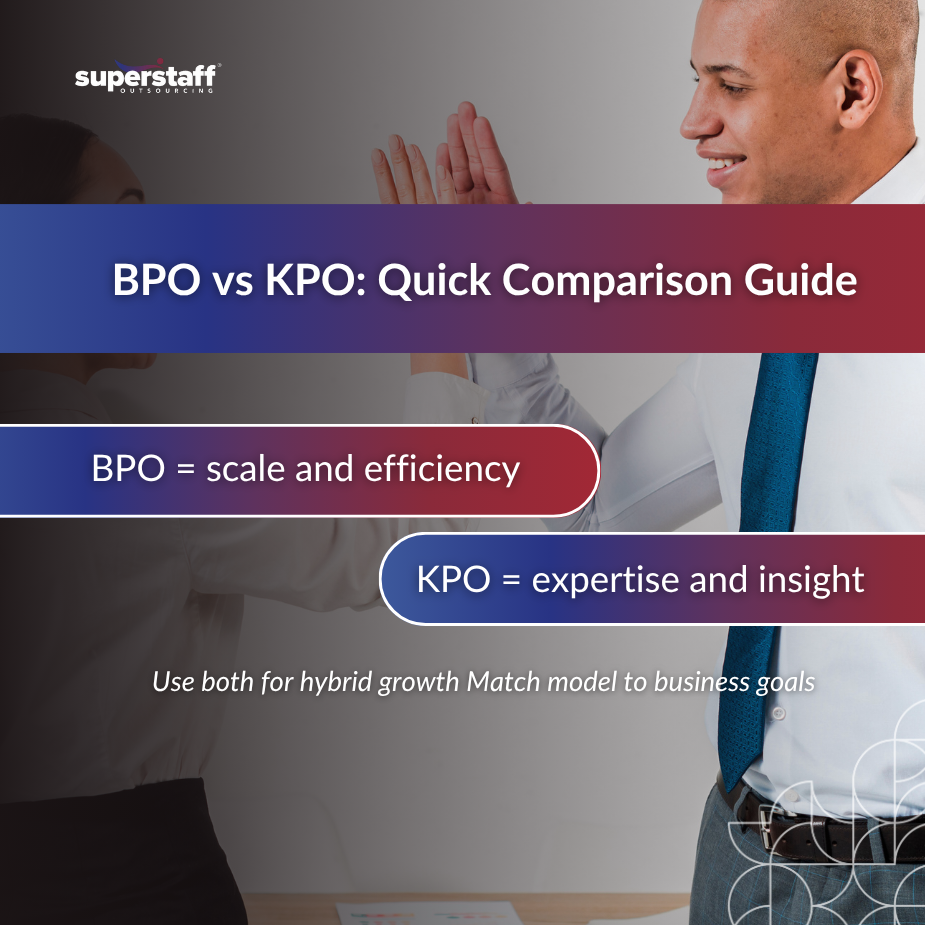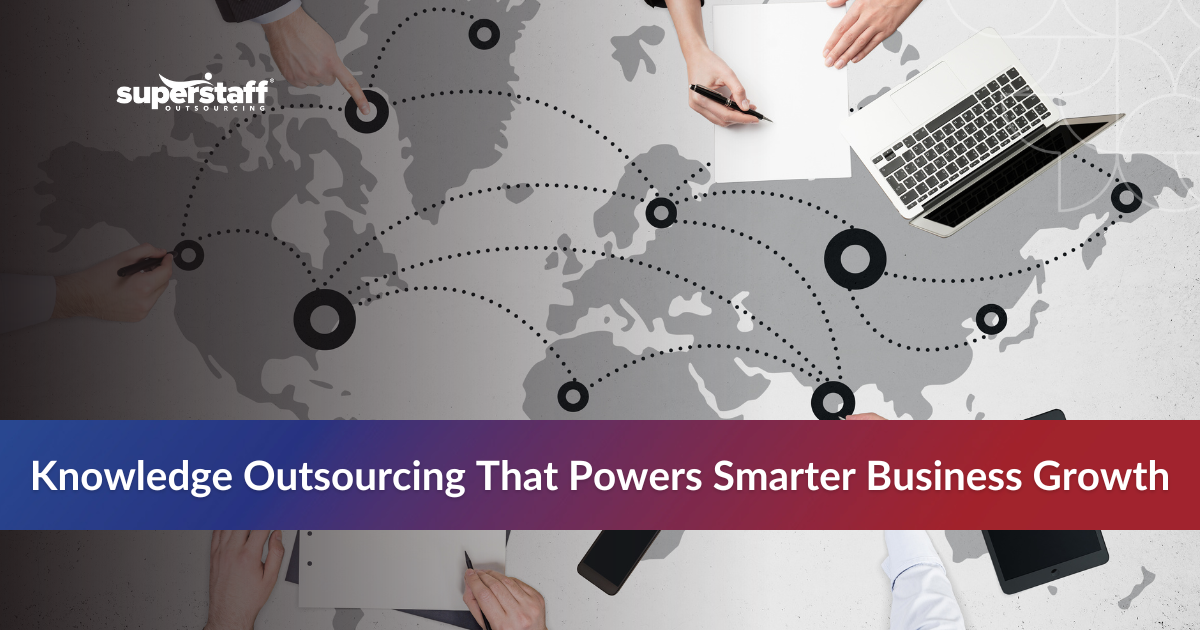
Outsourcing isn’t a one-size-fits-all strategy. Some businesses outsource to scale quickly, while others do so to gain access to deep expertise they can’t hire in-house. Two of the most common outsourcing models—BPO vs KPO—serve those goals in very different ways. Understanding how each model works can help you make better decisions about which outsourcing approach fits your current needs, your future goals, and the specific challenges facing your organization.
As the global economy becomes more competitive, companies are becoming more intentional about how and why they outsource. Some are looking to lower costs and improve turnaround times. Others are looking for specialized insights and skilled analysis they don’t have internally. That’s why it’s so important to understand the difference between BPO vs KPO. In simple terms, BPO focuses on repeatable tasks and operational efficiency. KPO focuses on specialized, knowledge-driven functions.
In this blog, we’ll walk through the differences between these models, share relevant use cases, and help you determine which outsourcing model best aligns with your goals.
What Is BPO vs. KPO? Understanding the Basics

At a glance, Business Process Outsourcing (BPO) and Knowledge Process Outsourcing (KPO) may seem similar—they both involve handing off business functions to a third party. But in practice, the two models deliver very different kinds of value.
BPO typically involves outsourcing standardized, repetitive tasks that follow a set process. These might include call center services, data entry, claims processing, or payroll management. For example, if you need 24/7 customer support or want to streamline your back-office operations, a BPO provider can handle those at scale.
KPO, on the other hand, involves outsourcing tasks that require specific domain knowledge, critical thinking, or specialized training. That could be anything from legal research to financial forecasting, from intellectual property analysis to medical data interpretation. Knowledge process outsourcing is about delegating high-value work that can’t be automated or templated.
While BPO providers prioritize scale and efficiency, KPO firms are built to deliver depth, insight, and strategic contributions. That difference becomes clearer as we explore their key distinctions in the BPO vs KPO landscape.
How BPO and KPO Compare in Practice
The most obvious difference between BPO vs KPO lies in the complexity of the work. BPO is focused on transactional tasks. It’s about getting things done consistently and cost-effectively. In contrast, KPO is built around high-level problem-solving and informed decision-making.
When you outsource to the Philippines for BPO, for instance, you’re tapping into a mature infrastructure that supports high-volume work. Filipino agents are known for their customer service skills, English fluency, and cultural compatibility with Western markets. You can scale a support team quickly, with minimal training time.
KPO teams, however, often require highly educated professionals with sector-specific experience. A knowledge process outsourcing partner may hire lawyers, analysts, or engineers to handle your most nuanced projects. Their training is deeper, and the scope of their work more strategic. Because of that, KPO engagements tend to be smaller in volume but higher in value.
Cost structures also vary. BPO typically follows a volume-based pricing model—think cost per call, per ticket, or per transaction. KPO pricing is more aligned with consulting, based on project complexity, hours of expertise, or deliverable milestones.
Another key difference in the BPO vs KPO conversation is strategic involvement. BPO teams execute a process. KPO teams help improve it—or design it from scratch. They’re more integrated with your decision-making process and may even influence product direction or market strategy.
When BPO Makes the Most Sense for Your Business
If your business is dealing with high-volume, repetitive work that’s pulling your internal teams away from more strategic goals, BPO is likely the right fit. Let’s say you’re an e-commerce brand preparing for the holiday rush. You need additional customer service agents, order management staff, and help desk coverage across time zones. A BPO partner can provide those resources on demand.
This is where the advantages of outsourcing really shine. With BPO, you get cost savings, faster turnarounds, and the ability to scale up or down based on seasonal needs. It’s also ideal for companies with well-documented workflows that don’t require much deviation. Industries like retail, telecom, logistics, and financial services are frequent users of BPO services because of their need to manage transactions quickly and consistently.
The key to success here lies in how well the BPO team integrates with your existing systems. If you outsource to the Philippines, you benefit from a well-established call center industry with proven reliability, round-the-clock support, and agents trained to match brand tone and service expectations. And in terms of BPO vs KPO, this is where BPO has a clear edge—speed and volume.
When Your Business Needs a KPO Approach
There are times when operational support just isn’t enough. If your business is looking to grow through deeper insights, technical know-how, or expert consultation, then KPO becomes your strategic play.
Think about a healthcare company analyzing patient outcomes to improve care protocols. Or a legal firm that needs comprehensive research support for ongoing litigation. These aren’t tasks that follow a script. They require interpretation, judgment, and specialized skills. This is where knowledge process outsourcing steps in.
If you’ve ever wondered, should I choose BPO or KPO for a project involving intellectual property evaluation or investment analysis, the answer likely leans toward KPO. These services can’t be handled by generalists. They require precision, domain experience, and often, data security protocols.
KPO is also a smart move when your internal teams are maxed out, but the stakes are too high to compromise on quality. Whether you’re building a new market entry strategy or conducting peer-reviewed medical studies, the right KPO partner becomes an extension of your leadership team, not just a support function.
BPO vs KPO decisions become even more relevant when your business operates in multiple markets or handles regulated industries where accuracy and expertise directly impact compliance and profitability.
Choosing the Right Model for Your Needs
So how do you decide between BPO vs KPO? It starts by understanding your priorities. Are you trying to free up internal resources? BPO might be the answer. Do you need support in making complex business decisions or developing new capabilities? Then KPO is a better fit.
But it’s not always an either-or situation. Many midmarket companies find success in blending both models. They outsource customer service and back-office tasks to BPO teams, while engaging KPO partners for strategic planning, compliance reviews, or market intelligence.
If your business is scaling quickly, a hybrid approach offers both the operational bandwidth and the strategic depth to grow sustainably. You can build a tiered outsourcing structure where the BPO team handles execution, and the KPO team provides insight and analysis on how to improve the process or anticipate future challenges.
The BPO vs KPO question really comes down to where your value creation lies—are you solving for volume, or solving for expertise? Most businesses eventually need both.
What Makes a Great BPO or KPO Partner
No matter which outsourcing model you choose, your success depends on selecting the right partner. If you’re outsourcing to the Philippines, look for BPO providers with strong infrastructure, reliable training programs, and the capacity to scale with your business. They should be able to meet your service level agreements without sacrificing quality.
For KPO partnerships, dig deeper. Ask about the backgrounds of their subject-matter experts. Understand how they handle intellectual property, data security, and compliance. You’re not just hiring a team; you’re trusting them with high-stakes responsibilities that could impact your reputation and revenue.
There are also qualities that both types of providers should share. They need to communicate clearly, adapt to your workflows, and have a strong grasp of your industry. Cultural fit matters too, especially when you’re working across time zones or integrating teams virtually.
In BPO vs KPO partnerships, shared success comes from collaboration, transparency, and a shared understanding of your business outcomes—not just processes.
Conclusion: Choosing the Right Fit in the BPO vs KPO Conversation
At the end of the day, BPO vs KPO is not just a technical distinction—it’s a strategic decision. BPO helps you do more with less by optimizing repetitive workflows. KPO helps you think smarter by bringing in expert capabilities you may not have in-house. Each serves a unique purpose, and in many cases, the most successful businesses leverage both.
If you’re still wondering which model is right for your business, let’s talk. At SuperStaff, we’ve helped companies around the world build custom outsourcing strategies that match their industry, budget, and growth goals. Whether you need scalable BPO support, specialized KPO expertise, or a combination of both, our team is ready to partner with you. Let’s build something smarter together.






